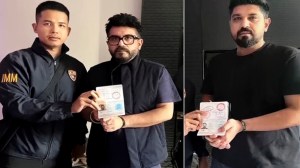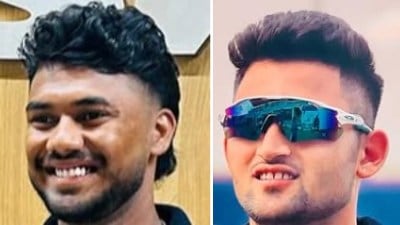OpenAI strengthens guardrails in Sora 2 after actor Bryan Cranston expresses concerns over deepfakes
OpenAI Sora 2 update, AI celebrity voice replication: OpenAI has updated its AI video tool Sora 2 with stronger guardrails to prevent unauthorised use of celebrity voices and likenesses, following concerns raised by actor Bryan Cranston and major Hollywood talent agencies.
 OpenAI Sora 2 update: Bryan Cranston urged OpenAI to strengthen its AI safeguards after Sora 2 replicated his voice and likeness without consent. (Express Image: Instagram/@bryancranston)
OpenAI Sora 2 update: Bryan Cranston urged OpenAI to strengthen its AI safeguards after Sora 2 replicated his voice and likeness without consent. (Express Image: Instagram/@bryancranston)AI celebrity voice replication: OpenAI, on Monday, October 20, released a joint statement with Hollywood actor Bryan Cranston, major Hollywood agencies, and the SAG-AFTRA union. In the statement, the AI giant headed by Sam Altman said that it has strengthened the guardrails on Sora 2 over replication of celebrity likenesses and voices.
OpenAI’s recently launched video generation model, Sora2, was able to replicate the voice and likeness of Cranston without compensation or consent. The company has been maintaining its policy requiring opt-in for the use of voice and likeness. However, now OpenAI has expressed regret for the unintentional generations. The company said that it has strengthened its guardrails around the replication of voice and likeness when users do not opt-in.
The issue was brought to the attention of SAG-AFTRA by Cranston. The Breaking Bad actor said that he was deeply concerned not just for himself but for all performers whose work and identity can be misused in this way. “I am grateful to OpenAI for its policy and for improving its guardrails, and I hope that they, and all of the companies involved in this work, respect our personal and professional right to manage replication of our voice and likeness,” the actor said in the joint statement.
Creative Artists Agency (CAA) and United Talent Agency (UTA), two of Hollywood’s biggest agencies that also represent Cranston, have reportedly raised alarms about the potential risk of Sora 2 and other generative AI platforms to their clients and to their respective careers.
OpenAI has an opt-in policy for uses of an individual’s voice or likeness in Sora 2. It needs to be noted that all artists, performers, and individuals have the right to determine how and whether they can be simulated. According to the statement, this policy shows the company’s commitment to artist rights, transparency, and the ethical deployment of generative AI technology. Moreover, the company has also committed to responding to any complaints regarding such matters with urgency.
Sora 2 was launched on September 30, following which several publications have reported that many in Hollywood were teeming with anger. This was after OpenAI reportedly told multiple talent agencies and studios that if they did not want their clients or copyrighted material replicated on Sora 2, they would have to opt out rather than opt in. However, the AI startup had later countered these reports, saying that its intention has been to give public figures full control.
Closer to home, the debate around misuse of personality rights by AI chatbots has been brewing for weeks. Earlier this month, several artists from the Indian film industry, including Anil Kapoor, Suniel Shetty, Aishwarya Rai Bachchan, Asha Bhonsle, and Arjit Singh, moved court to secure protection for their personality rights amid growing misuse of their likeness through AI-generated deepfakes.







